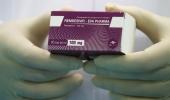Artificial shortages and brazen hawking of the drug on the streets at 15 times the normal price rule the day as the official machinery tries desperately to stamp out the parallel market, reports Sohini Das.

The day Preeti Mishra (name changed) was waiting in her car to give a swab sample at a laboratory near AIIMS in the capital, hawkers kept walking past the line of cars selling Remdesivir.
“They were offering a 50 per cent discount on the ‘prevailing rates’ and each vial was Rs 40,000 or so,” said 35-year-old Mishra. She was familiar with the price because her family and friends had paid a massively inflated black market price of Rs 50,000 for a vial of the anti-coronavirus drug when they needed it recently for a family member.
“They were selling like hot cakes. The hawkers would sell three vials at a time and ask the patient’s family to come back for more if the patient survived,” she recalls. The Rs 40,000 price tag is 15 times the correct price of Remdesivir: Rs 900 to Rs 3,490 depending on the brand.
Doctors are using anti-viral drugs such as Remdesivir and Favipiravir and the immunosuppressive drug Tocilizumab, originally developed for other diseases, to treat Covid patients in the absence of any established therapy.
Tocilizumab, an injectable drug marketed by Cipla in India and given to hospitalised patients, is also in short supply. Such is the desperation for Tocilizumab that, in a letter dated April 27, Rajiv Wadhawan, director, ministry of health and family welfare, said that states should use their stocks ‘judiciously and strictly’ as per the standard protocol.
The pharmaceuticals department and the ministry have finalised the interim allocation of this drug to states in consultation with Cipla, which imports it from Roche.
The health ministry is trying to stress that the indiscriminate use of Tocilizumab, Remdesivir, and Favipiravir should be avoided. It maintains that they need to be administered only to hospitalised patients who are on oxygen support, not in the Out Patient Department or in homecare.
A leading Mumbai-based pulmonologist said that in his home town of Ahmedabad, patients were being given Remdesivir in the OPD. “This pushes up the demand and creates a false demand. Someone who is stable at home quarantine does not need this injectable drug at all,” he said.
Remdesivir, an injectable drug developed by United States drug company Gilead, is made by a complex chemical process which takes almost two weeks. While firms have ramped up production, there is a time lag between the start of producing a batch and the time it hits the market.
“If a deficit of, say, even 2,000 vials happen in the Mumbai market daily, within a week’s time this spirals out to almost 15,000 vials. This is when the black marketers swing in and make the most of the situation,” said Jagannath Shinde, chairman of the All Indian Origin Chemists & Distributors, the umbrella organisation of chemists and pharmaceutical distributors covering over 8,00,000 outlets across the country.
Shinde said leakages are happening from hospitals through a nexus of doctors and nurses. “District collectors keep a tab on the distribution of Remdesivir and ask the distributors and stockists to send doses to specific hospitals depending on requirements. However, there is no reporting system for hospitals whereby they can account for the doses they have received,” he said.












 © 2025
© 2025